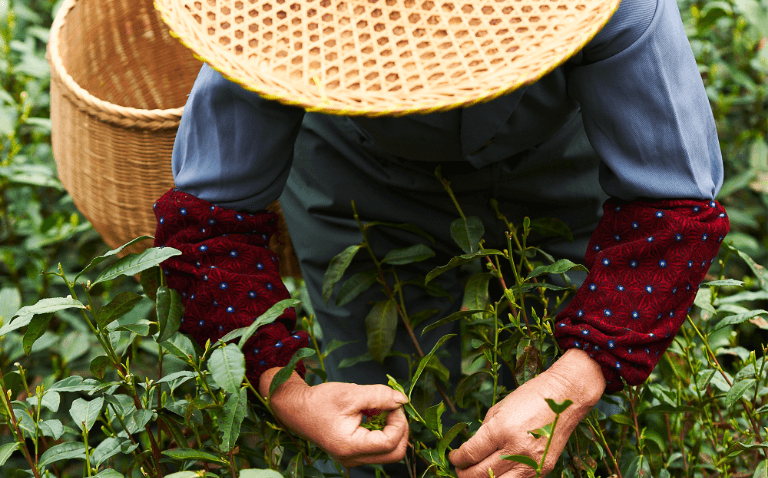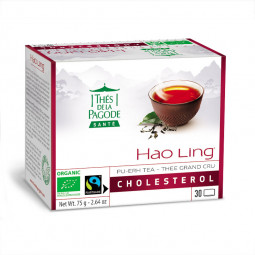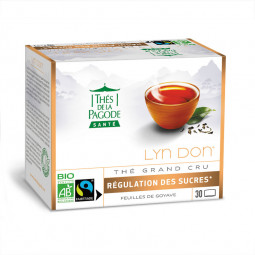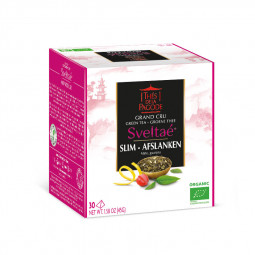Hao Ling
Pu-erh tea helps regulate cholesterol


Delivery within 8 to 12 days

Secure payment

Programme: 1 to 3 tea bag a day

1 tea bag in 400 ml of water

Duration: 10 minutes

Temperature: 95°C

Enjoy until late afternoon
Description
Hao Ling tea is a very rare, organic pu-erh tea from China’s Yunnan province. It has a subtle, delicate flavour and is grown in the “Six Great Tea Mountains” region using traditional Chinese methods.
It is obtained following lengthy fermentation of the tea leaves, followed by post-fermentation lasting anywhere from a few weeks to a few months depending on the desired flavour. Pu-erh tea is known and appreciated for its rounded notes and soft mouth feel.
It offers numerous health benefits and is particularly renowned for aiding digestion. Drink a cup after meals to achieve a feeling of lightness.
Hao Ling tea helps maintain normal cholesterol levels. A scientific study carried out in 2016 in collaboration with the University of Poitiers and Toulon-Sud-Var in France confirmed the properties found in Hao Ling tea. Hao Ling tea is an effective ally in maintaining a healthy heart in conjunction with a balanced diet.
The only tea that helps maintain a good cholesterol level.
Thanks to its blend of 3 organic Grand Cru teas (pu-erh tea, wulong tea and green tea), Hao Ling® is a rich tea in EGCG (epigallocatechin gallate), a catechin that contributes to maintain a good cholesterol level and has a protective action on the arteries. Two studies conducted in a population at cardiovascular risk and in a population with normal but low levels of good cholesterol, have shown the positive effects of consuming Hao Ling® tea on maintaining good cholesterol levels.
Ingredients
mode d'action
Synergie entre catéchines et théaflavines

Régulation de la Cholesthérolémie

Circulation normale du sang, paroi lisse et homogène
Alimentation trop riche
Stress
Consommation de tabac
Risque de maladies cardiovasculaires
Risque d’athérosclérose

Caillot sanguin formé à cause du dépôt de graisse
les études sur hao ling
Les études sur Hao Ling ont été réalisées en double aveugle versus placebo sur 131 patients présentant une hypercholestérolémie.
Dès 1 mois de programme
Evolution positive du bon cholestérol (g/l)


Thé Hao Ling

Placébo
Grâce à Hao Ling®, les apolipoprotéines A1 (Apo A1) sont augmentées après 1 mois de consommation régulière à raison de 3 infusettes par jour.
Ces protéines (Apo A1) sont responsables du transport du bon cholestérol (HDL).
Une concentration augmentée en Apo A1 est associée à une augmentation des HDL (le bon cholestérol) et donc une augmentation de l’épuration de l’excès de cholestérol de votre organisme.
Dès 3 mois de programme
Diminution des triglycérides (g/l)


Thé Hao Ling

Placébo
Les triglycérides et le cholestérol représentent deux lipides différents nécessaires au bon fonctionnement de l’organisme, à condition de ne pas être en excès.
Une consommation régulière du thé Hao Ling® permet de diminuer l’excès de ce lipide (triglycérides) et/ou de le maintenir à un taux normal.
Dès 3 mois de programme
Amélioration du rapport entre bon & mauvais cholestérol


Thé Hao Ling

Placébo
Le thé Hao Ling® contribue à la lutte contre le développement de la dyslipidémie, principalement en favorisant le rapport bon cholestérol (HDL) / mauvais cholestérol (LDL).
Ce rapport HDL/LDL représente l’indicateur le plus important selon les cardiologues.
conclusions sur les bienfaits d’hao ling
Hao Ling contribue ainsi à protéger votre santé, en complément d'une alimentation variée et équilibrée, en agissant sur 3 facteurs lipidiques cruciaux :

Augmentation du bon cholestérol
Augmentation du bon cholestérol description

Diminution des triglycérides
Diminution des triglycérides description

Amélioration du rapport entre bon et mauvais cholestérol
Amélioration du rapport entre bon et mauvais cholestérol description
conclusions: votre texte ici
Manufacturing secrets
A precious plucking

Thés de La Pagode® respects an age-old tradition to ensure that all the benefits of tea are preserved. Indeed, the quality and fragrance of a tea are determined, among other things, by the type of leaf picked. In spring, in the gardens of Thés de la Pagode®, the "Imperial Plucking" is practiced: the pluckers select only the bud ("Pekoe" in Mandarin) and the first leaf. Another technique used is "fine picking". In this case, the pickers remove the bud and the first two leaves.
The ABC patent. A unique patent for the enrichment of organic tea for health
Our certifications









